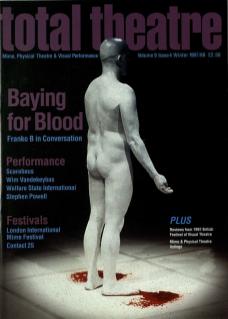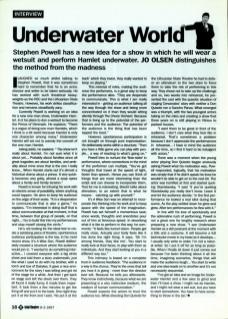I laughed so much whilst talking to Stephen Powell that it was sometimes hard to remember that he is an actor, director and writer to be taken seriously. He has worked with such theatrical heavyweights as the RSC and the Lithuanian State Theatre. However, his work defies classification and remains steadfastly zany.
Currently Powell is working on an idea for a new one-man show, Underwater Hamlet. In it he plans to don a wetsuit to become the Prince of Denmark. He explains: ‘There is a vogue of doing one-man Hamlets, which I think is a bit weird because Hamlet is only one character among many.’ Underwater Hamlet will set out to parody the conceit of the one-man Hamlet.
Joking aside, he explains: ‘The show isn't really about Hamlet. I'm not sure what it is about yet... Probably about families since all great tragedies are about families, and probably about mine since that is the one I really know... When Hamlet starts out it's almost a historical drama about a prince. It very quickly becomes very gritty, almost a soap opera about a family and family tension.’
Powell is known for infusing his work with an electric sense of possibility, where anything could happen. He aims to keep his audience on the edge of their seats. ‘It is a desperation to communicate that is also a game,’ he explains. ‘I'm interested in doing stuff that is about communication at that moment, in that time, between that group of people, on that night... I try to build this into my performances and stop myself closing the circle.’
He's not looking for the ideal text to create a satisfying piece of theatre; spontaneous audience participation is the key. In his most recent show, It's A Wise Son, Powell deliberately created a structure where the audience would join in. ‘I wanted to do something interactive... I covered everyone with a big white sheet and told them a story underneath, just like what I used to do with my brother, with a torch and box of Dairylea. It gave a nice environment for the story I was telling and got rid of the stage for a while. And then I got back on stage and left the sheet over them. They all found it really funny. It made them important. It took them a few minutes to get the thing off and put it to the back. One night they put it at the front and I said, “No put it at the back” which they loved, they really wanted to keep on playing.’
This reversal of roles, making the audience the performers, is a great way to keep the performance alive. ‘They are desperate to communicate. This is what I am really interested in – getting an audience talking all the way through the show and being more concentrated on it than they would sitting silently through The Cherry Orchard. Because that is living up to the potential of the performers and the audience. The potential of the audience is the thing that has been tapped the least.’
However, spontaneous participation is not brought on through pure improvisation. He deliberately works within a structure. ‘Then you have a little game you can play with people... a way of reacting to what's going on.’
Powell tries to nurture the flow-state in performance, where connections in the mind of the performer can multiply. ‘You've got thoughts that travel at the speed of light, faster than speech. Hence you can think of things that are more interesting than the script and can choose to incorporate them. That for me is interesting. Brecht talks about alienation; to an extent that is what he means – catching up with yourself.’
It's A Wise Son was an attempt to incorporate this thinking into his work and to keep apace with the speed of the imagination. Powell has set himself a momentous task; since words, thoughts and anecdotes pour out of him at ferocious speed. In describing what it is like to perform in this way, he comments: ‘It feels like tunnel vision. People get really close. Actually your body feels like it has done the right thing. It says, “Oh I'm among friends, they like me.” You start to really look at their faces, to play with them as individuals. And they start looking at you in a different way too.’
This intimacy is based on a complete trust in audience feedback. ‘The audience in a way is the chorus. They're the ones that tell you how it is going – more than the director ever will. Because he tells you afterwards. They know instinctively, because what we are presenting is a very instinctive medium, the medium of human communication.’
Powell expects the actors to trust the audience too. While directing Don Quixote for the Lithuanian State Theatre he had to deliver an ultimatum to the two stars to force them to take the risk of performing in this way. They chose not to take up the challenge and so, two weeks into rehearsal, he presented the cast with the quixotic situation of staging Cervanates' story with neither a Don Quixote nor a Sancho Panza. What emerged was a triumph, with the two youngest actors taking on the roles and creating a show that three years on is still playing in Vilnius to packed houses.
‘I want them to be great in front of the audience. I don't care what they look like in rehearsal. That's sometimes a problem because I don't appreciate the performances in rehearsal... I have in mind the audience all the time, so I find it hard to be indulgent with actors.’
There was a moment when the young actor playing Don Quixote began anxiously asking Powell what his motivation was. Powell responded, logically, that his motivation was simply that if he didn't speak his lines he wouldn't be able to get on to the next bit. ‘The actor was horrified at first and started quoting Stanislavsky. I said, “if you're quoting Stanislavsky you really don't know. Leave it and let the audience decide.” In the first performance he looked a real idiot during that scene. As the play settled down he grew and grew. After ten performances he flew with it.’
In line with his love of spontaneity and the adrenaline rush of performing, Powell is not a great one for lengthy research when preparing a new show. ‘I see Underwater Hamlet as a still postcard at the moment with a title and a costume. It will become a full technicolor movie in my head as it develops... I usually only write to order. I'm not a natural writer. So I put it off for as long as possible. When I finally sit down it just comes out because I've been thinking about it all the time, imagining scenarios, things that will make the audience laugh... You start to write and one idea leads on to another and it's not necessarily sequential.’
‘I've got an idea and an image for Underwater Hamlet and a few axes to grind and then I'll have a show. I might not do Hamlet, and I might not wear a wet suit, but you have to start somewhere. You have to have something to throw in the bin.’

